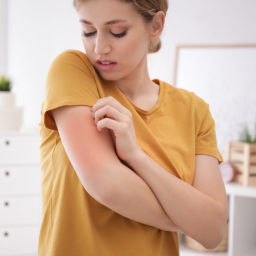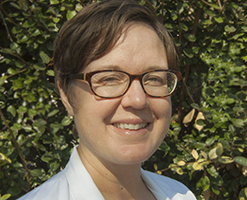 Atopic dermatitis, commonly known as eczema, is classified as red, itchy, sometimes painful skin. This can occur in people of any age–from infants to the elderly. Many in the dermatology world claim that “no cure has been found for atopic dermatitis.” But what most don’t know, is that skin pathology is really an expression of poor gut health, systemic inflammation, and an overburdened liver. This fundamental misunderstanding leads more to the suppression of symptoms than addressing the true cause and ultimately to healing.
Atopic dermatitis, commonly known as eczema, is classified as red, itchy, sometimes painful skin. This can occur in people of any age–from infants to the elderly. Many in the dermatology world claim that “no cure has been found for atopic dermatitis.” But what most don’t know, is that skin pathology is really an expression of poor gut health, systemic inflammation, and an overburdened liver. This fundamental misunderstanding leads more to the suppression of symptoms than addressing the true cause and ultimately to healing.
Eczema, rosacea, and psoriasis (an autoimmune reaction to the skin) are directly related to chronic gut inflammation, otherwise known as leaky gut. This inflammation in the bowel doesn’t only manifest as indigestion, gas, diarrhea, or constipation. Often, skin is the more sensitive and expressive organ. This is due to two primary reasons–gut inflammation decreasing overall vitamin D levels and the type of immune reactions released.
Vitamin D production starts when sunshine hits your skin. We used to claim low vitamin D levels in the blood (anything under 40 ng/mL according to the Vitamin D Council) meant you were not in the sun enough. This theory gradually fell apart when people who were in sunshine frequently–lifeguards, farmers, landscapers, people who worked outside–showed up deficient. It was then understood that inflamed gut tissue required more vitamin D to heal and maintain tissue turnover. This inflammation simply spent more vitamin D than one was making.
Vitamin D is vital for skin health! It regulates cellular proliferation, metabolism, differentiation, and apoptosis for maintenance of the skin barrier and immune function.(1) Low vitamin D does not support skin healing, and is a major contributing factor to redness (rosacea), flaking, puffiness, acne, and tenderness. Having your doctor check your vitamin D is vital to appropriate dosing. In addition, clean up your diet! Knowing the foods that create leaky gut addresses the most common reason for vitamin D depletions.
Eczema means your bowel is more inflamed than you know
Since significant bowel inflammation can actually exist without the experience of irritable bowel, why don’t you feel abdominal discomfort? The surface area of the bowel is vast–between 30 and 40 square meters.(2) There just may be enough of it working well that you don’t noticing the issue. Also, sometimes people do have gut issues, but they are accustomed to the feeling. It isn’t until later, when their digestive system is healthy, that they recognize the subtle issue after eating problematic foods.
Gut inflammation really over-activates certain cytokines (chemical messengers made by your immune system in response to problems) which results in an excessive immune reaction that overburdens the liver. This is turn leads to skin inflammation and irritation like white heads, redness, and heat. Again, clean up the diet by taking away food sensitivities, and you reduce this problem for clearer, healthier skin.
Itching of the skin triggered by gut inflammation may start a self-perpetuating itch-scratch-itch cycle. This is the time to palliate, or help stop the symptom. Over-the-counter antihistamines can be helpful, but colloidal-oatmeal has unique fibers and cellulose that have been proven to soothe inflamed skin and help keep it from drying out, stopping the itch and helping healing. This gives an advantage over antihistamines, and comes in the form of lotion or spray.(3) We like using topical applications of Eczema Lotion, a pharmaceutical-grade colloidal oatmeal formula. Earth’s Care makes an Eczema Lotion that we love, and so does Acure (which is on sale 15% off this month!).
A clean diet is the main determinant to healing skin, but sometimes supporting the liver is necessary. The liver must clear the immune storm, called oxidative stress, ensuing from your leaky gut. The glutathione pathway of the liver is the main antioxidative pathway for clearing this mess. N-Acetyl-Cysteine (NAC) is a common, affordable amino acid given to support glutathione production. In addition, Vitamin C recharges glutathione, helping the liver detox the immune reactions. When inflammation is excessive, giving liposomal glutathione and vitamin C supports extreme skin reactions. Because liposomal glutathione is a slightly more expensive option, short courses of its supplementation are utilized, followed by NAC and Vitamin C. NuMedica has a Liposomal Glutathione loved by many, and Peoples also carries one from Researched Nutritionals.
Skin issues are rarely skin issues. It is tempting to think conditions like acne and itchy, red, flaking patches are problems that arise with the skin, but organ systems including digestion and the liver truly originate the issue. Understanding how the body expresses inflammation and imbalances in these systems helps us know why skin issues occur and gives us the ability to address the cause and heal your skin, rather than merely covering it up. Don’t just take away your acne, rosacea, eczema, or psoriasis…fix the true issues underneath your skin.
 Amy Nelson, ND* received her Naturopathic Doctorate from the National College of Natural Medicine in Portland, OR where she studied nutrition, homeopathy, herbal and functional medicine. In addition, Dr. Nelson was the Associate at The IBS Treatment Center in Santa Monica where she treated irritable bowel syndrome and complex food allergies. Dr. Nelson utilizes her experience in natural medicine to address female and male hormonal imbalances, mental health, and digestive disorders. Amy is available for consultation at Peoples North.
Amy Nelson, ND* received her Naturopathic Doctorate from the National College of Natural Medicine in Portland, OR where she studied nutrition, homeopathy, herbal and functional medicine. In addition, Dr. Nelson was the Associate at The IBS Treatment Center in Santa Monica where she treated irritable bowel syndrome and complex food allergies. Dr. Nelson utilizes her experience in natural medicine to address female and male hormonal imbalances, mental health, and digestive disorders. Amy is available for consultation at Peoples North.
*Although licensed in other states, Naturopathic Doctors are not currently licensed in Texas.
If you have comments and/or questions about this blog, email us at blog@peoplesrx.com.
1. Umar M, Sastry KS, Al Ali F, Al-Khulaifi M, Wang E, Chouchane AI. Vitamin D and the Pathophysiology of Inflammatory Skin Diseases. Skin Pharmacol Physiol. 2018;31(2):74-86. doi: 10.1159/000485132. Epub 2018 Jan 6. PMID: 29306952.
2. Herbert F Helander, Lars Fändriks. Surface area of the digestive tract – revisited. Scandinavian Journal of Gastroenterology, 2014; 1 DOI: 10.3109/00365521.2014.898326
3. Reynertson KA, Garay M, Nebus J, Chon S, Kaur S, Mahmood K, Kizoulis M, Southall MD. Anti-inflammatory activities of colloidal oatmeal (Avena sativa) contribute to the effectiveness of oats in treatment of itch associated with dry, irritated skin. J Drugs Dermatol. 2015 Jan;14(1):43-8. PMID: 25607907.
